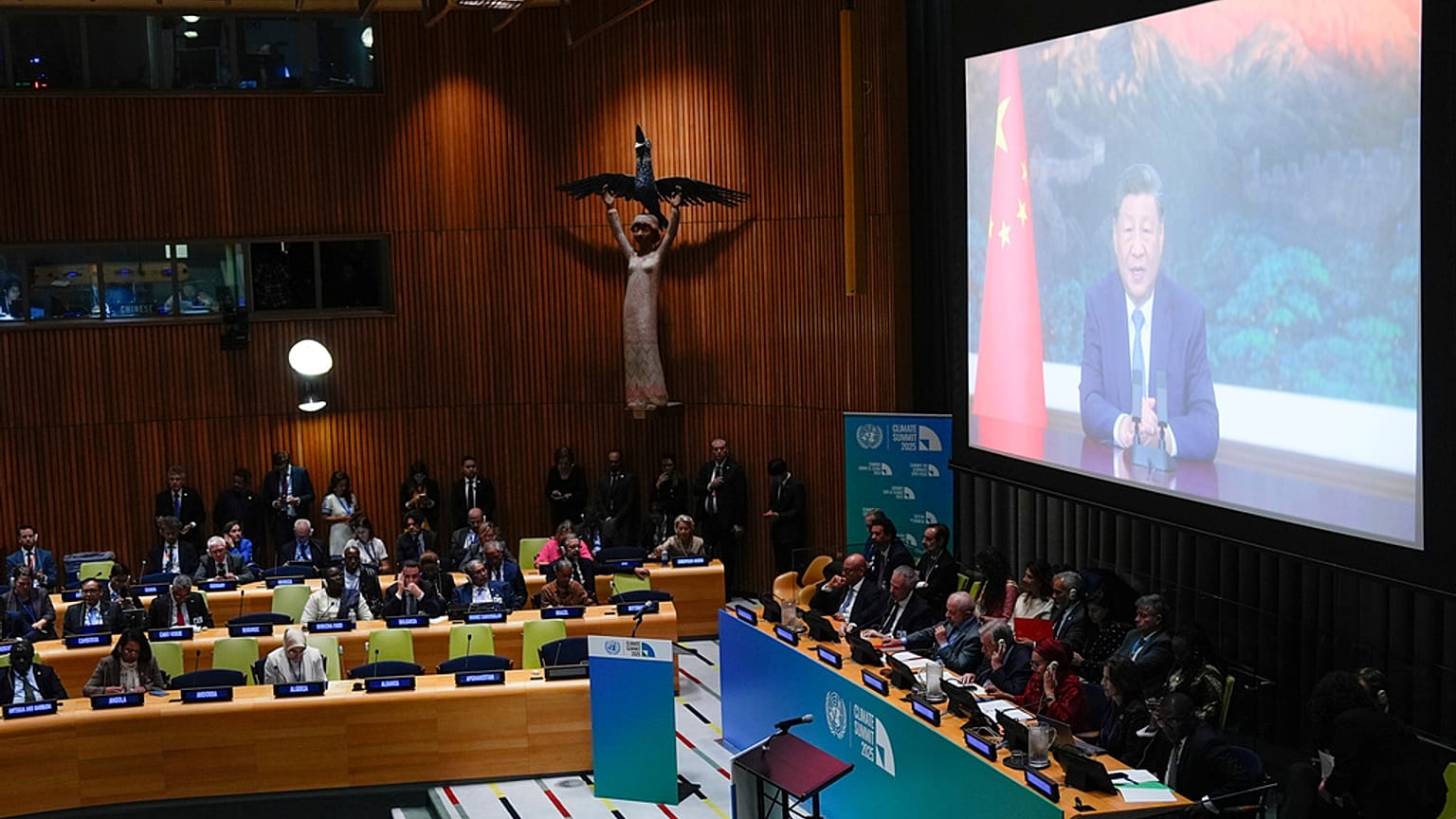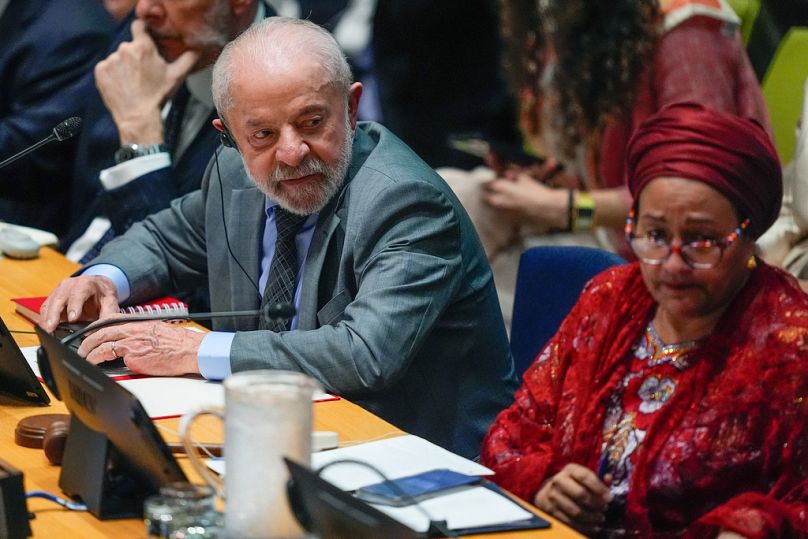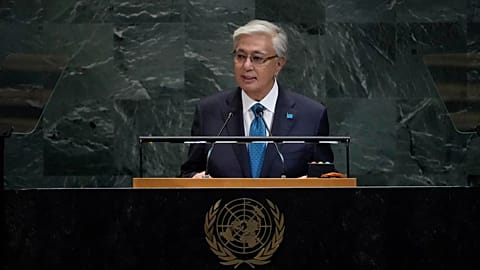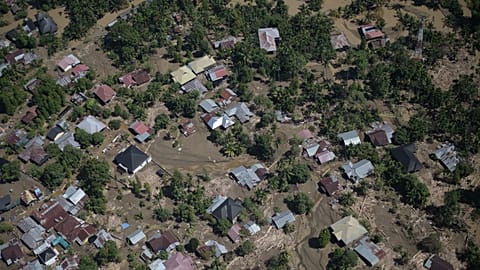Around 100 nations, responsible for about two-thirds of the world's emissions, gave plans or some kind of commitments to further curb fossil fuel emissions and fight climate change at the UN General Assembly on Wednesday.
With China leading the way by announcing its first emission cuts, world leaders said Wednesday they are getting more serious about fighting climate change and the deadly extreme weather that comes with it.
At the United Nations' high-level climate summit, Chinese President Xi Jinping announced the world’s largest carbon-polluting country would aim to cut emissions by 7 per cent to 10 per cent by 2035.
China produces more than 31 per cent of the world's carbon dioxide emissions, and they have long been soaring.
The announcement came as more than 100 world leaders gathered to talk of increased urgency and the need for stronger efforts to curb the spewing of heat-trapping gases.
With major international climate negotiations in Brazil six and a half weeks away, the United Nations Secretary-General Antonio Guterres convened a special leaders summit on Wednesday during the General Assembly to focus on specific plans to curb emissions from coal, oil and natural gas.
After more than six hours of speeches, promises and announcements, about 100 nations, responsible for about two-thirds of the world's emissions, gave plans or some kind of commitments to further curb fossil fuel emissions and fight climate change, Deputy Secretary-General Amina J. Mohammed said.
In a video address, Xi pledged that China would increase its wind and solar power sixfold from 2020 levels, make pollution-free vehicles mainstream and “basically establish a climate adaptive society.”
Europe then followed with a less detailed and not quite official new climate change fighting plan.
Ursula von der Leyen, president of the European Commission, said last week that member states agreed that their emissions-cutting targets would range between 66 per cent and 72 per cent. The EU will formally submit its plan before the November negotiations.
While the new promises are in the right direction and show a stronger commitment to fighting climate change, “these targets will not be enough to keep us safe from climate destruction,” said Jake Schmidt, senior strategic director for international climate at the Natural Resources Defense Council.
Trump's climate comments challenged
Xi and Brazil’s leader also made statements on Wednesday afternoon that may have referred to US President Donald Trump’s attacks a day earlier on renewable energy and the concept of climate change.
“While some countries are acting against it, the international community should stay focused on the right direction," Xi said.
Brazilian President Luiz Inácio Lula da Silva, who is hosting the upcoming climate conference, said, "no one is safe from the effect of climate change. Walls at borders will not stop droughts or storms,” Lula said.
“Nature does not bow down to bombs or warships. No country stands above another.”
Said Guterres: “The science demands action. The law commands it. The economics compel it. And people are calling for it.”
Time to ‘wake up’ amid catastrophes
Marshall Islands President Hilda Heine said she was there to issue “a demand for us all to wake up from a community whose hospitals and schools are being destroyed’’ by rising tides. She said she has regularly been awakened by floods and drought emergencies in her small island nation and that it will soon be others' turn.
“If we fail to wake up now and end our dependence on fossil fuels the leaders of every country in this room will be woken up by calls about catastrophes of wildfires, of storms, of heatwaves, and of starvation and drought," she said.
Pakistani Prime Minister Muhammad Shehbaz Sharif said his country knows this all too well, with recent floods that have affected 5 million people across over 4,000 villages, killing over 1,000.
“As I speak to you, my country is reeling from intense monsoon rains, flash floods, mudslides and devastating urban flooding,” he said.
“We are facing this calamity at a time when the scars of the 2022 floods that inflicted losses exceeding $30 billion (€25.6 billlion) and displaced millions are still visible across our land.”
Anthony Albanese, prime minister of Australia, called this a decisive decade for climate action and said Australians know the toll of more frequent and extreme weather events like cyclones, floods, bushfires and droughts.
“Australia knows we are not alone,” he said.
‘Here we must admit failure’
“Warming appears to be accelerating,” climate scientist Johan Rockstrom said in a science briefing that started the summit.
“Here we must admit failure. Failure to protect peoples and nations from unmanageable impacts of human-induced climate change.”
“We’re dangerously close to triggering fundamental and irreversible change,” Rockstrom said.
Texas Tech climate scientist Katharine Hayhoe told leaders that every tenth of a degree of warming is connected to worsening floods, wildfires, heat waves, storms and many more deaths: “What’s at stake is nothing less than everything and everyone we love.”
In a news conference, Lula said he invited both Trump and Xi to the November climate negotiations, saying it’s important that leaders listen to scientists.
Under the 2015 Paris climate accord, 195 nations are supposed to submit new, more stringent five-year plans on how to curb carbon emissions from the burning of coal, oil and natural gas.
UN officials said countries really need to get their plans in by the end of the month so it can calculate how much more warming Earth is on track for if nations do what they promise. Former US President Joe Biden submitted America's plan late last year before leaving office, and the Trump administration has distanced itself from the plan.
Before 2015, the world was on a path for 4°C of warming since pre-industrial times, but now has trimmed that to 2.6°C, Guterres said.
However, the Paris accord set a goal of limiting warming to 1.5°C since the mid-19th century and the world has already warmed about 1.3°C since.
Experts underwhelmed by China's climate plan
Simon Stiell, the UN's climate chief, said the Chinese plan "is a clear signal that the future global economy will run on clean energy. And that for every country, stronger and faster climate action means more economic growth, jobs, affordable and secure energy, cleaner air, and better health, for all of us, everywhere.”
Lula also praised China's announcement, but some advocates were underwhelmed. They said China has a reputation for under-promising and over-delivering on climate action.
“China’s latest climate target is too timid given the country’s extraordinary record on clean energy," said former Colombian President Juan Manuel Santos, chair of the group The Elders.
"China must go further and faster.”
Andreas Sieber, associate director of policy and campaigns at environmental organisation 350.org, said the target was "both underwhelming and transformative".
"Reducing emissions by 7-10 per cent by 2035 from peak levels falls short of what the world needs, yet it anchors the world’s largest emitter on a path where clean-tech defines economic leadership."
But, Sieber reiterated, China has often "under-promised and over-delivered" on its climate targets.
"Now the real test lies in the next Five-Year Plan, which must go further: phasing out coal, accelerating renewables, and ensuring frontline communities benefit from the energy transition."



















